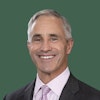Published
September 26, 2020
Our nation’s small businesses — the engine that powers so much of America’s economy — have been hit particularly hard by the pandemic and the corresponding economic repercussions. Only a very small number of those who received initial PPP funds expect to be able to maintain current payrolls without additional government assistance, and many believe the pandemic’s impacts will continue to reverberate for at least another six months to a year, if not longer.
Not surprisingly, then, the economy is front and center on most small business owners’ minds as they consider casting their ballots this November, according to the latestSmall Business Index by MetLife & the U.S. Chamber of Commerce. Fifty-seven percent of small business owners rank the economy as the first or second most important issue when deciding who to vote for, and 81% say that the impact a candidate’s policies will have on their companies play a role in deciding which candidate to support.
That raises the question: What do small business owners really want to hear from President Trump and former Vice President Joe Biden as they enter the home stretch of the campaign?
Ahead of the first presidential debate, we asked five small business owners in battleground states to share what they will be listening for during the debates, which issues they hope the candidates will discuss in more detail, and why it all matters to their companies and their employees. Here’s what they had to say (some responses have been very lightly edited for length and clarity).
Traci Tapani
Owner and Co-President, Wyoming Machine, Inc. in Stacy, Minnesota:

“The COVID-19 pandemic has identified many issues that need to be addressed. Structural problems in health care, digital infrastructure (especially in rural areas), racial inequity, supply chain weaknesses, etc.
I want to know what actions the candidates would take and how they would prioritize the work that needs to be done to make our country and our economy stronger and more resilient.”
Dick Cardew
Founder, Cardew Hay Co. in Phoenix, Arizona:
“If I had to pick one issue that matters most to my business and livelihood, it would be the candidates’ ability to get a second round of COVID-related help done ASAP.
For me, this would include but not be limited to providing a second round of Paycheck Protection Program assistance to my fellow small business owners in the most vulnerable industries; speed up and simplify the PPP loan forgiveness process; make the 2017 tax cuts permanent for small businesses; and make PPP loan capital tax-deductible.
While our equity markets and, recently, commodity markets are chugging along, America's small businesses are hurting. I'm very concerned about a number of our clients who have seen dramatic declines in revenue since March of this year. We need the President to commit to leading and be able to negotiate with both sides to get this done.”
Zawadi Bryant
CEO, Nightlight Pediatric Urgent Care in Houston, Texas:
“I would like the candidates to discuss their plan to reform healthcare. Our healthcare system is broken, expensive and inefficient. My business provides healthcare, so when people are uninsured or underinsured demand for my services go down.
As a business owner, healthcare is one of my biggest expenses. Each year the premiums go up and the coverage/benefit goes down. This is not sustainable.”
Liz O'Brien
CEO, Freedom Learning Group Lake in Lake Mary, Florida:
“As CEO of a veteran-owned small business that provides last mile training for military spouses, I am particularly concerned around the widening skills gap that exists in the workforce. The Closing the Skills Gap 2019 Research Report by Wiley Education Services and Future Workplace reveals a 12% increase in the number of HR professionals reporting a skills gap across America.
Small businesses are struggling to meet production requirements in a tight talent market. How will we harness the power of employers, the government, and educators to close America’s skills gap and secure the future of work?”
Adam Fazackerley
Founder & COO, Lay-N-Go in Alexandria, Virginia:
“Many small businesses in the U.S. are on life support due to the impact of COVID-19 on their business. Our customer mix went from being made up of 35% privately owned small retailers and spas to 10% almost overnight. Doors were shut and the lights turned off. While Lay-n-Go was able to find other digital channels to sell into, these closed businesses were not.
We need to elect a President and Congressional leaders with clearly defined plans designed to bolster the Main Street economy through pro-business legislation and responsible financial support.
We feel that if the focus needed for "Post-COVID Reconstruction" is not properly managed and planned, the cornerstones in our neighborhoods, American families, the economy's health, and the future for the next generation of entrepreneurs would be at great risk.”
Related: The K-Shaped Recovery and the Cost of Inaction
About the authors

Thomas M. Sullivan
Thomas M. Sullivan is vice president of small business policy at the U.S. Chamber of Commerce. Working with chambers of commerce and the U.S. Chamber’s nationwide network, Sullivan harnesses the views of small businesses and translates that grassroots power into federal policies that bolster free enterprise and reward entrepreneurship. He runs the U.S.





